Philippines: Let’s All Work for a Better Party-List System
Akbayan (Citizens Action Party) | 22.12.2012 01:42 | Analysis | Social Struggles | Workers' Movements | World
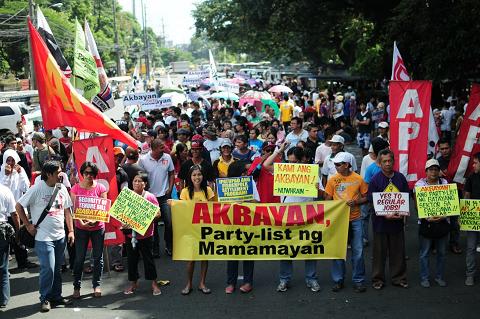
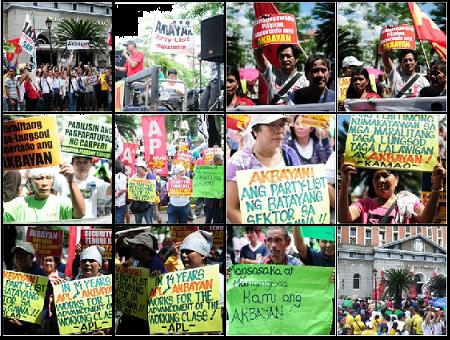
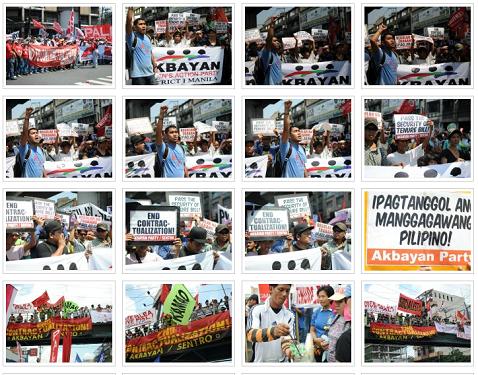

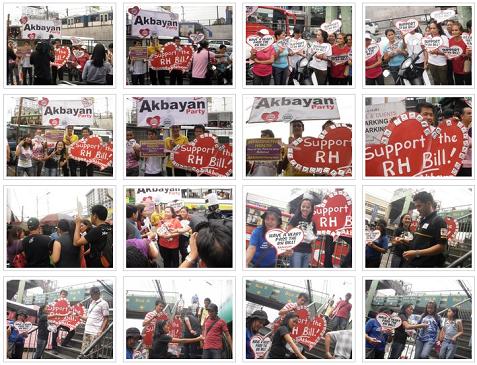
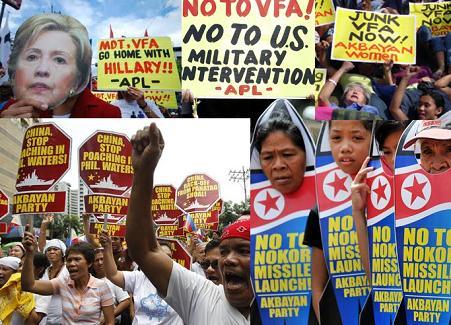
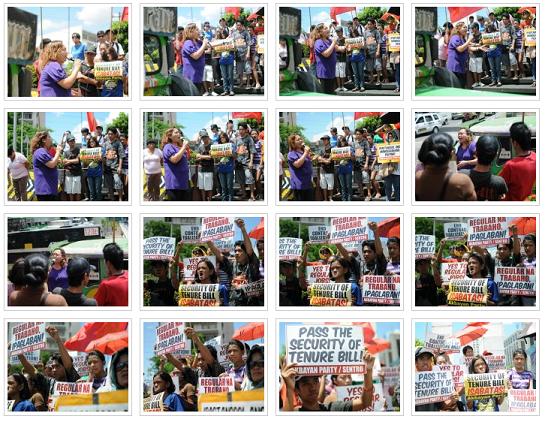
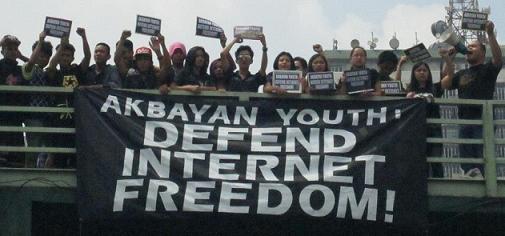
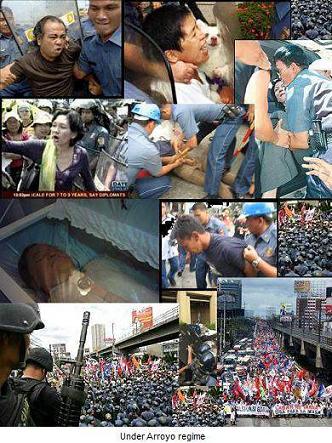
However, while we commend the Comelec’s effort, we beg to differ on some of its rulings, particularly, its decision to deny the application of Partido ng Manggagawa Coalition (PMC), among others. We believe the decision is contrary to the interests of the marginalized and the underrepresented.
PMC is a coalition composed of groups and social movements deeply rooted in the marginalized sectors, primarily, the Filipino workers. Its nominees have undisputed track records and are in fact veteran leaders of trade union and labor organizations. It also enjoys the respect of the broad progressive movement and civil society community. How the election body failed to consider these important characteristics of the coalition baffles many.
We can only hope that the PMC will find relief in the Supreme Court and obtain a ruling that will rectify this error.
However, the strategic resolution to the problems besetting the party-list system lies in the collective effort to reform the party-list system. This is an endeavor that would necessitate the coming together of different progressive and reform-oriented party-list groups as well as other organizations working on electoral reforms. We believe that meaningful reforms can be achieved, not by maligning fellow genuine party-list groups, but by building consensus on how specific measures can be collectively advanced both inside and outside of the House of Representatives.
Thus, we urge all partylist groups to join us in the effort to amend Republic Act No. 7941 or the Party-List Law to make it more consistent with the constitutionally mandated intent of further democratizing the country’s political and electoral system. Now more than ever, the different partylist groups must join hands in this important task.
In the future, we urge the Commission on Elections to be more judicious in its scrutiny of party-list organizations applying for accreditation, so that legitimate groups will not be deprived of their rightful place in our democratic process. We make the same appeal to the Supreme Court that it would decide on the party-list cases brought before them with utmost diligence.
Lastly, we call on the voting public to take full ownership of the party-list system and support the reform measures that are now pending in Congress. Let us not forget that the party-list system is a legacy of the 1986 people power revolt, and was specifically designed to promote democratization and give greater voice to ordinary Filipinos.
Turning our backs on the PL system is abandonment of our own political inheritance, and is a great disservice to those who toiled and sacrificed to deepen democracy and establish a government that represents the voice of the people.
 http://akbayan.org.ph
http://akbayan.org.ph __________________________________________________________________________
Building the coalition for a labor party
After the formation of a broad labor unity for the fight against contractualization spearheaded by the Philippine Airlines Employees’ Association (PALEA) and staging of a big workers rally in the central business district of Ayala, Makati in November 2010, the idea crystallized that a worker representative in Congress was an urgent necessity to complement the parliament of streets. The felt need for a working class representative who can amplify the grievances and demands of the labor movement was a heated subject of discussion among several groups involved in the PALEA struggle. The discourse led to the conclusion that in the coming elections, labor groups had to field a party-list group which can serve as the voice and tribune of the working class in Congress.
Thus from December 2010 to early February 2011, various groups resolved to participate in the formation of a party-list coalition to advance workers’ issues and concerns. The culmination of the process was the formal establishment of the Partido ng Manggagawa Coalition in February 13, 2011 by a spectrum of workers groups representing formal and informal sector workers nationwide. The founding general assembly adopted the name Partido ng Manggagawa Coalition and the acronym PM Coalition in recognition that it exactly captured the rationale, essence and character of the union.
The founding member organizations of PM Coalition are Alyansa ng Maralitang Pilipino (AMP), Central Negros Electric Cooperative Union of Rationale Employees (CURE), Displaced Workers Association of Teresa, Rizal (DIWATA), Labor Power Council-Negros (LPC-Negros), Nasudnong Katawhang Kabus (NAKABUS), Partido ng Manggagawa (PM), Rosario Workers Association (RWA), Samahan ng mga Manggagawa sa Antipolo (SMA), Samahan ng Manggagawa ng Paranaque (SMP), United Cavite Workers Association (UCWA), United Panay-Iloilo Truck Drivers Association (UPTDA), United Skilled Plumbers Association Inc. (USPA) and the Samahan ng Mamamayan-Zone One Tondo Organization (SM-ZOTO). These are all duly registered labor unions, workers associations and informal sector organizations with a constituency that is spread across the country.
The general assembly elected an interim leadership which had the task to expand and consolidate the coalition in preparation for the next party-list election. Elected President was Ambrocio Palad, individual member from PALEA, and Vice President was Annie Enriquez-Geron, individual member from the Public Sector Labor Independent Federation (PSLINK). The two dedicated and respected labor leaders were elected as an expression of “private-public partnership” since they came from the private and public sector wings of organized labor.
Among the founding members of the PM Coalition were Renato Magtubo (representative of PM), Gerardo Rivera (individual member from PALEA), Benjamin Tundag (representative of CURE) and Philadelfa Burdeos (individual member from Mindanao). They will later be chosen, together with Annie Enriquez-Geron, as PM Coalition's nominees for the party-list elections in 2013. Since the establishment of PM Coalition, all five nominees were active participants in the undertaking of the organization for the advancement of the labor sector.
The founding general assembly likewise resolved that the coalition and its constituent organizations will heighten the movement against labor contractualization, for a wage increase, for affordable housing and even reproductive health since it was understood that the latter is a working class concern.
Fighting for workers issues
As a labor party-list organization, the newly formed PM Coalition hit the ground running by participating in campaigns around the burning worker issues of the day. While the organizations which constituted the PM Coalition were in the frontlines of the struggles and demands for these labor concerns, the union slowly but surely propagated the call for a labor representative in Congress, and patiently and doggedly recruited groups and individuals into the alliance.
One of the important advocacies of PM Coalition was pushing for the passage of the Security of Tenure bill in the House of Representatives. In view of the resistance encountered by the sponsors of the bill in Congress, the PM Coalition focused on building a constituency for the proposal through information dissemination and popular education among workers at the grassroots level.
Among the notable actions in which the PM Coalition took part in was the International Women’s Day celebration in March 8, 2011 in which it pushed for the passage of the contentious Reproductive Health bill.
In the run up to the Labor Day commemoration of 2011, PM Coalition propagated the call for a wage increase in view of the rising cost of living. The Labor Day campaign culminated in a unity rally on May 1, 2011 in which PM Coalition and its constituent organizations joined.
Solidarity for PALEA
As the labor dispute between Philippine Airlines (PAL) and PALEA ratcheted up, the PM Coalition actively solicited support for the embattled union. Among the significant efforts was the consolidation of the Church-Labor Conference and its mobilization in the fight against contractualization. A crucial juncture in the PM Coalition's solidarity effort was the huge workers rally on April 1, 2011 when PALEA was on the verge of holding a paralyzing strike. The strike was averted only because of a last-minute assumption order from the Labor Department which was condemned by the PM Coalition for suppressing workers’ legitimate right to strike.
The PM Coalition was also active in the next stage of the labor dispute in the last half of 2011. After the Office of the President allowed PAL to layoff some 2,400 ground employees in August 2011, PALEA decided to launch a protest against the mass termination and outsourcing scheme. The PM Coalition was in the thick of the solidarity campaign for PALEA in its life and death struggle against labor contractualization and union busting.
The alliance issued an all hands on deck call to its constituent groups to mobilize support for the September 27, 2011 protest by PALEA. Hundreds of PM Coalition members rallied despite the heavy rains of Typhoon Pedring while PALEA members were forcibly evicted from the airport and other PAL offices. When PALEA set up a protest camp outside the PAL In-Flight Center, the PM Coalition put up its own tent in a show of support. The tent was destroyed in the midst of the tyrannical attack by hired goons on the PALEA protest camp last October 29, 2011. Even in the Mactan International Airport, the PM Coalition and its constituent groups in Cebu was the main prop of PALEA. Up to now, PM Coalition maintains its support for PALEA’s struggle since the fight against contractualization is an imperative struggle of workers today.
Advocate for workers at the local, regional and national level
The PM Coalition has been active not only in advocating for working class issues on the national scope but also on the regional and local levels. Wherever workers stand up and fight for their rights and welfare, the PM Coalition strives to be in support of their struggles.
In Calabarzon or Region IV-A, the PM Coalition has been collaborating with workers associations to conscienticize a new generation of labor leaders and organizers. New forms and methods of labor organizing and political education are being developed to confront the changed realities brought about by globalization among the workers in Calabarzon. The PM Coalition has been conducting labor education seminars and political study sessions among workers in Rizal, Cavite, Laguna and Batangas since its founding.
Meanwhile in Cebu, the PM Coalition is working hand-in-hand with export zone workers in protecting labor rights and welfare in the Mactan Economic Zone and nearby industrial areas. After more than three decades in existence, no single union with a collective bargaining agreement presently exists in the Mactan ecozone which is the second biggest in the country. In a pioneering experience, regular and agency workers of Blaze Manufacturing Corp.—with support from the PM COALITION—formed two separate unions and won the respective certification elections despite management interference. In response, Blaze management shutdown the factory and then later reopened it with a controversial clearance from the Philippine Export Processing Zone Authority (PEZA). The PM Coalition and its constituent groups picketed the PEZA national office in Metro Manila in support of the Cebu workers.
Aside from educating, organizing and mobilizing formal sector workers, the PM Coalition also worked with informal settlers to advocate for housing for the poor. In May of last year, the PM Coalition assisted a number of urban poor affected by the demolition of Mahiga Creek in Cebu City and other pending areas for demolition by the city government. PM Coalition's affiliated organization in Cebu dialogued with the city government to demand a moratorium on demolitions and decent relocation for the urban poor. The engagement between the urban poor and the city government of Cebu continues as a concrete expression of the PM Coalition's platform for affordable housing.
In Iloilo province last June 2011, truck drivers of the Harbour Link Transport Inc. filed a case against management for non-payment of 13th month pay, service incentive leave and holiday pay and then were illegally dismissed for their complaint. Over the course of several months, the PM Coalition assisted the workers in the legal case and in mass actions. The drivers won their case by September 2011 and were reinstated to their jobs. The PM Coalition is currently supporting the truck drivers in forming a labor union and a workers association to organize transport workers in other establishments.
Sugar workers in Negros are to be massively affected by the implementation of the zero tariff policy come 2015. The PM Coalition has been engaging with farm workers associations and agrarian reform cooperatives in information dissemination among sugar workers on the impact of the zero tariff regime. The PM Coalition is calling for alternative employment, protection of labor standards and nationalization of land in response to the threat of mass retrenchment and grave dislocation in the sugar haciendas. Benjamin Tundag, as CURE union president and LPC-Negros officer, has been active in the information dissemination campaign regarding the zero tariff regime and its adverse impact on farm workers.
In Mindanao, the PM Coalition has been busy conducting labor and political seminars among cannery workers in Zamboanga City, port workers in General Santos City, transport workers in Cotabato and Davao, and informal settlers in Davao City. This mass education effort is in preparation for launching campaigns to defend and advance working class demands for decent jobs, living wage and affordable housing. Together with PM Coalition coordinators in Mindanao, Philadelfa Burdeos has been busy in the mass education work among workers in the island.
Expanding and consolidating the labor party
In view of the experience of PALEA, the plan to elect a labor representative in Congress through the party-list system caught the imagination of active and progressive workers organizations and labor leaders. Thus the expansion and consolidation of PM Coalition accelerated at the start of 2012.
More groups and individuals were attracted to the idea and the reality of a labor party-list coalition. Among the major organizations which decided to enlist in the PM Coalition since the start of 2012 was PALEA, Yellow Bus Line Employees Union (YBLEU) in Mindanao and the Valenzuela Informal Settlers Federation (VISFED).
In a bigger general assembly on March 11, 2012, the mandate of the interim set of officers was renewed by the broader composition of the PM Coalition and the nominees for the coming party-list election were selected. The interim leadership was tasked with among others, completing the requirements of participation in the coming party-list election.
Akbayan (Citizens Action Party)